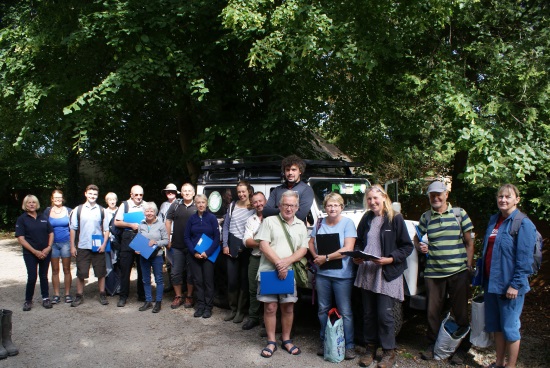Reports
The Nocturnal World of Bats and Moths
22 July 2023
After two days of torrential rain, the clouds finally departed enabling 18 participants and organisers to enjoy an evening of discovery!
The company gathered in the Riverside Room and the evening began with an informative talk by Charlie Pass, conservation and engagement officer for The Wyre Rivers Trust. Charlie's illustrated presentation taught us about bats, their biology, and behaviour - in particularly those we would be likely to encounter that evening.
Following Charlie’s talk Dave McGrath, retired environmental officer for Blackpool Council, demonstrated how to set up a moth trap in the outdoor classroom. He explained about the types of lamps used and how to collect specimens for identification.
As it grew dark, we set off to walk along the path between salt marsh and trees. Charlie handed out at least one bat detector to each pair of attendees and to everyone’s delight, the bats were out. We spent a good hour watching and listening, picking up their clicks on the bat detectors. Pipistrelle, Noctule and Brown Long-eared bats were the local residents.
When we returned to base, Dave switched on the lamp to lure the moths to the trap and specimen jars were used to hold the moths to enable identification. Thoroughly engrossed in the process, it was nearly midnight before we said goodnight to bats, moths and naturalists!
Thanks go to Charlie Pass and Dave McGrath for their knowledge, equipment, time and enthusiasm, also to the interested participants of all ages and backgrounds who made the evening such fun.
Elisabeth Green CBiol MRSB
Year 12 Schools' Quiz
28 June 2023
After last year's successful Year 12 Schools' Quiz, Myerscough College were delighted to act as hosts again, a fine venue for the 2023 biology challenge. Teams of four year 12 students from schools all over the North West of England and one school from the white rose county over the Pennines, took on ten sets of biology-based questions.
Each challenge lasting 15 - 20 minutes was devised by the North Western branch committee members, as well as staff at Myerscough College, SeaLife Blackpool and the Wyre Rivers Trust. The subject matter was engaging and testing, students having to apply their biological knowledge and think outside the curriculum ‘box’. Subject matter included pharmaceuticals, freshwater quality index, owl pellet dissection, sharks, plant lives, bees, endangered species and African wildlife.
Each attendee received a certificate of attendance and a commemorative mug, members of the top four teams were presented with book prizes and the winning school received a quality Brunel microscope. We were fortunate to have the RSB Regional Membership Officer, Christopher Longmore attend the Quiz and present the prizes to the winning teams. The results were very close, each question was awarded a percentage mark.
Results: 1st: Stonyhurst College 773. 2nd: Wirral grammar School for Girls 763. 3rd: Hutton 6th Form College 756. 4th: St Ambrose College 751. Xaverian College deserve a mention scoring 750.
Elisabeth Green CBiol MRSB
Small Mammals Ecology Day
22 April 2023
The interview, reported in the spring issue of The Biologist with Tim Sparks and Kate Lewthwaite, emphasised the importance of recording the appearance of species on the calendar, phenology. In 2015 the RSB North Western branch instigated the first BioBlitz at the Wyre Estuary Country Park and have taken the lead role in the subsequent June BioBlitzes.
As the popularity and increasing need to expand the areas of interest has increased, the branch has been preparing for BioBlitz 2024. In order to ensure sufficient numbers of recorders we have organised Ecology days that are led by recognised experts in their particular field.
In 2022, the focus was on Invertebrate Orders, and this year we have looked at GIS, plants and vertebrate groups. In April, Dr Alan and Hilary Bedford shared their enthusiasm and knowledge relating to small mammals. It was an early start for the 12 trainees as the traps had been set the evening before and the weather was damp and on the cool side, therefore early release was important for survival of the captured rodents who were identified, sexed and weighed before being returned to their runway.
A classroom session followed detailing the types of traps available, pre-baiting, bait options, positioning, runways, thermal range and the species of small mammals that are likely to be recorded as well as how to identify and estimate populations. Our methods on the day captured mice, voles and shrews. However, Alan also demonstrated the use of video cameras in photographing larger mammals such as rats, hedgehogs, otters, badges and foxes.
Hopefully, we now have a band of Biologists who can join the recording teams for the fourth BioBlitz to be held on June 14th and 15th 2023, the North Western branch welcomes volunteers with expertise from other branches who would like to join us on this exciting and important project.

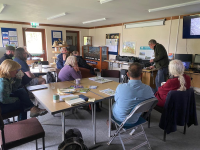
Jean Wilson MBE CBiol FRSB
A fish eye view of Loch Sunart
22 March 2023
This evening event was well attended and kicked off with full access to the Manchester Sea Life centre and all it had to offer from starfish to sharks and seahorses to turtles, with centre staff keen to answer any questions on the exhibits. This was followed by a convivial buffet reception with drinks and a wide range of cheeses and freshly cut bread sticks.
The main event followed with a short trip to the lecture theatre through the Lego centre. Here Dr Mark Woombs took us on an underwater photographic journey through Loch Sunart, a 19 mile long sea loch on the west coast of Scotland. This loch is a ‘Marine protected Area’ or MPA and as Mark explained it has many rare and unique species, for example the Serpulid tube worm (Sepula vermicularis), which Mark photographed in Loch Teacuis a small side loch off Loch Sunart. The very presence of this rare species is one of reasons why Loch Sunart is classified as an MPA. Another species leading to this designation is the Celtic feather star (Leptometra celtica), this species is usually found at over 100m depth but in Loch Sunart it occurs as shallow as 12m. As Mark explained this may be due to the exceptionally sheltered environment afforded by this long sea loch which may mimic the tranquillity of much deeper waters.
The whole lecture was richly illustrated throughout with Mark’s photographs taken on his diving excursions to the loch, we were all truly awed by the stunningly detailed and colourful, intimate shots, as shown below.
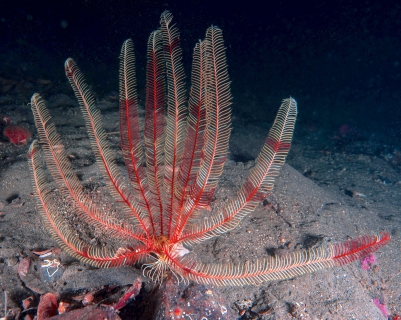
Many thanks to all the staff at the Sea Life centre for their hospitality and to Jean Wilson and Elisabeth Green for the food and wine.
Michael Clapham FRSB
Introduction to Invertebrates workshop
26 February 2022
This full day event was the first in a series of eight running until July 2022, and was held at Wyre Estuary Country Park. It was the first for two years for the North Western branch, where we had real people attending and not just faces on a screen; a real social as well as a learning experience!
The day was led by husband and wife team Dr Alan Bedford and Hilary Bedford, who have developed considerable expertise in capturing, identifying and reporting on the national database species of (mainly) insects. Hilary and Alan pointed out early in the day that our area, the north west, has some of the poorest records of invertebrates in Britain, which they are endeavouring to rectify both personally and by encouraging others to take up the reins!
Hence we started with the basics: how to use dichotomous keys to identify various samples of invertebrates, from insects to worms and slugs, all supplied by Alan and Hilary. For this we had to use microscopes and, for example, count antennae segments on a bumble bee.
Guests then learned how to use various capture techniques, not all lethal, with practical demonstration and participation ‘in the field’, generating lots more specimens for ID back in the lab.
The day was concluded with a lecture on ‘photo stacking’ and ‘reverse lens macro’ to produce very detailed images of even the tiniest invertebrate, truly inspiring stuff!
A massive thanks to Alan and Hilary for all the detailed preparation and inspiring and accessible delivery.
It would also be remiss not to mention the wonderful lunch with homemade cakes provided by Jean Wilson, especially the cakes; lemon drizzle, carrot and ginger, spoilt for choice and all delicious. With seven workshops left that’s 21 more cakes please Jean?
I must encourage any member and friends with any level of interest and any level of expertise in this area (complete novices will ‘get it’ and learn so much) to book to attend one of the remaining workshop now, and don’t forget the cakes!
Michael Clapham FRSB
Ecology for All 2020 goes online
July 2020
For the spring and summer of 2020 the North Western branch had devised a series of seven, one day ‘Ecology for All’ courses focusing on different orders of invertebrates. In 2019 our ecology days had concentrated on ecosystems, and our 3-year strategic plan was to prepare enthusiasts, both amateur and professional for the 2021 BioBlitz.
After recording 706 species in the 2018 BioBlitz we recognised that records for invertebrates were distinctly lacking, both at a local and national level for the north west of England.
The COVID-19 pandemic caused the branch to have a rethink about how to meet these aims, as we were loath to abandon our programme. Therefore, with most communication going online, we devised a series of short videos.

On Saturday 4th July in tolerable weather conditions and with social distancing in place, the production team gathered at Wyre Estuary Country Park. The film crew were more than impressed by our presenters, Dave McGrath on moths, Mike Clapham on macro-photography and the Hans and Lotte Hass team of the North Western branch, Alan and Hilary Bedford.
A number of recording styles were used including direct presentation, outdoor on-site filming and verbal presentation of PowerPoints. There were no retakes and our stars were naturals on camera! The programme will consist of four short videos:
- Introduction to invertebrates
- Methods of Collection: Moth traps, pit fall traps, water traps, pooters, sweep nets, tree beating
- Identification of invertebrates and the use of keys
- Macro-photography
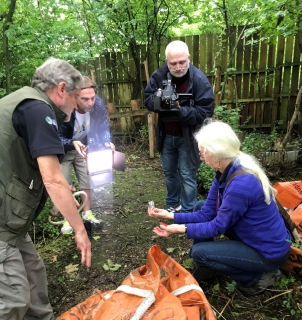
We were supported throughout the day by Wyre Council Countryside Rangers. Their attention was much appreciated and certainly ensured a hassle-free day. If the video is well-received, then we would certainly be more than happy to extend our programme perhaps concentrating on specific orders of invertebrates such as Order Diptera; after all, ‘Every Fly Counts’!
The North Western branch Ecology for All videos will be available shortly on the Royal Society of Biology YouTube channel.
Jean Wilson MBE FRSB
Ecology for All series, River Wyre and Morecambe Bay
May-July 2019
‘Ecology for All’ was the North Western branch’s first attempt to engage people of all levels of ability and experience in fieldwork at a number of locations along the River Wyre and Morecambe Bay. We were supported on this venture by Wyre Council and the Wyre Rivers Trust.
The six ecology days began on the muddy shores at Knott End, where attendees were introduced to the species found, their taxonomy and their likely location in the littoral zone. A dichotomous key was used to identify the mermaid’s purses found along the strandline.
The following Thursday saw appropriately clad trainee ecologists conducting a belt transect from the upper to the lower zones of the salt marsh at Stanah. The data collected from this outing will be used in future surveys to consider the process of succession which is visibly occurring in this region.
The wildlife photography day was linked to the trapping of small mammals who were employed as models. Over 30 mice and voles were caught in live traps and a few rodents were selected and kept for a short time in glass tanks. The tanks were suitably prepared with grass sods, and the animals’ behaviours were caught on camera after expert guidance on camera settings and angles.
The freshwater ecology day involved water testing, kick sampling, electro-fishing, insect trapping and identification. This was a popular day blessed with glorious sunshine. All at sea!
After trawling the sea bed of the Wyre Channel and collecting plankton, the specimens were brought ashore for observation and identification. We were indebted to the RNLI at Fleetwood who allowed us the use of the deck area and the committee room which we converted into a laboratory for the day, making full use of our recently purchased microscopes.
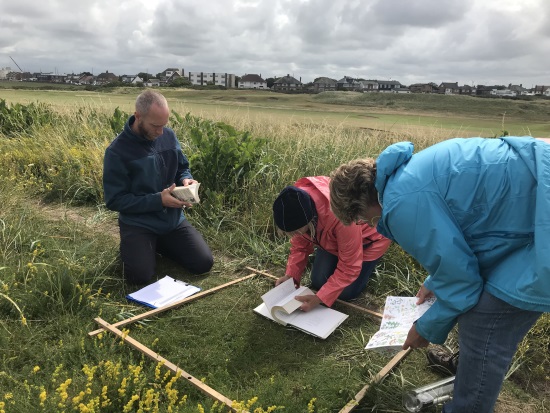
The final activity was on the sand dunes at Rossall Tower, a perfect platform for bird observation and a good preparation for the bird transect survey. This accompanied the survey conducted on the dunes to establish percentage cover of plant species.
The feedback from the North Western branch ecology days has been extremely positive and we are looking to extend the idea to include weekend courses. We hope that next year we will be able to select specific orders of species such as Hymenoptera and Lepidoptera for investigation.
This series of events shows that hard work and good planning does pay off and the information collected will be added to the appropriate data bases.
The branch is always happy to extend its group of passionate biologists on days such as these. If you would like to assist please contact us at northwest@rsb.org.uk
Jean Wilson MBE CBiol FRSB
Contrasting patterns of coral growth across Australia’s Great Barrier Reef and Coral Sea
9 January 2019
Black tipped reef sharks cruised by and a giant green sea turtle occasionally inspected the delegates from their ocean aquarium tank as Deborah Burn, an exceptional young scientist originally from Preston in Lancashire shared her research, career path and influences in the atmospheric surrounding of the Sea Life centre in Blackpool.
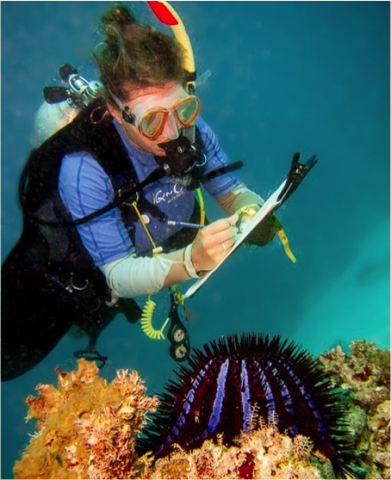
Deborah graduated with a first class honours degree in marine biology from Newcastle University. As an undergraduate she completed a dissertation on coral diseases in Venezuela before taking a position in the Maldives as a science officer for the Marine Research Station and then as the marine biologist for a 5* Resort. Her research focussed on reef restoration and rates of coral recovery following mass coral bleaching events and the changing behaviour of the Crown of Thorns Starfish (Acanthaster planci)
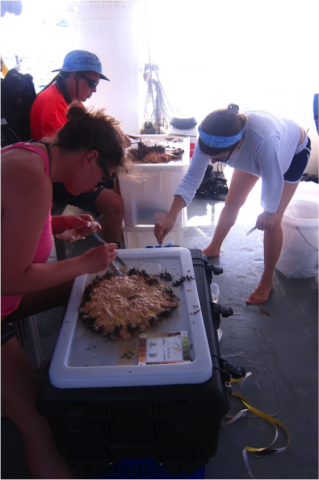
A move to the ARC Centre of Excellence for Coral Reef Studies at James Cook University in Australia as a research assistant for Professor Morgan Pratchett has allowed her to focus on coral growth dynamics and Crown of Thorns Starfish ecology and compare datasets from the Great Barrier reef to those collected in the Maldives.
In February 2019, Deborah starts an MPhil at the Centre focussing on the spatial and temporal variation in coral growth and reef replenishment in the Coral Sea Marine Park and the Great Barrier Reef. She demonstrated the fascinating novel methods for measuring coral growth including 3D photogrammetry that she will use in her future research.
Delegates explored the exhibits at Sea Life and chatted with the staff who were excited by the imminent new arrival of a black tipped shark pup. A very enjoyable evening was closed with a short address from the chairman Mike Clapham and the presentation of a gift of appreciation with a Lancashire flavour for Deborah to enjoy when back in Queensland.
Dr David Wareing MRSB
The Amazon, its people, animals and ecology
22 November 2018
In a wide-ranging talk about the Amazon River, Mike Clapham discussed aspects of life for local people. He told how those living along the river in floating houses make their livelihood looking after boats, selling ice, or catching, buying and transporting the immense range of fish species to be found in the river. One concerning aspect of this lifestyle was the risks they endure, moving about in their small wooden canoes, from the large numbers of four metre caiman which share their living space.
Several people die each year this way, and Mike told an interesting tale of three large caimans, which seemed to have learned to co-operate in capsizing canoes (maybe!).
We heard further stories of wasps, tortoises, tapirs and toads with no eyes. But perhaps the most fascinating was the complex relationship between weaver birds, cow birds, wasps and bot flies; a truly intricate and intriguing example of apparent evolutionary ‘decision’ making which results in a host accepting one parasite to mitigate the effects of another.
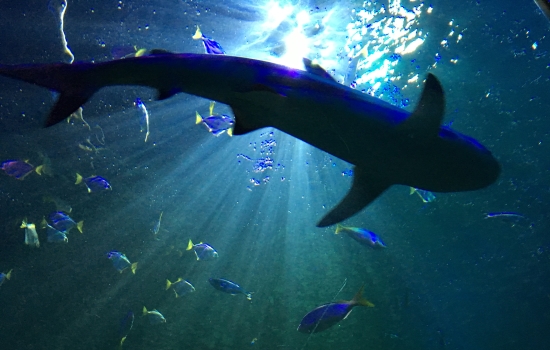
The event was attended by 40 members from all around the region who enjoyed a tour of the SEALIFE centre on arrival and welcome drink and refreshments. The immersive experience took place in the Ocean Tunnel exhibit and as guests relaxed before the event they were treated to a fantastic close up experience with giant green sea turtles, black tip sharks, white tip sharks, stingrays, shovel nose sharks, nurse sharks, grouper, vampire fish and many more.
There was an opportunity to network with friends and meet new colleagues during the half time break in the proceedings. It was a blustery night in Blackpool but for a short time we were transported to a tropical paradise during a highly entertaining and very informative presentation.
Jean Wilson OBE CBiol FRSB
Bioblitz at Wyre Estuary
22 June 2018
Lancashire born Mike Harding was our celebrity guest at the beginning of this 24 hour BioBlitz. Mike is a renowned comedian, author, poet and presenter who has fished the rivers of the north of England for more than 60 years. Having noticed many negative changes in riparian habitats, he told the gathering at the park that “we are drinking at the last chance saloon and activities such as the BioBlitz, which raise awareness of environmental issues, are to be applauded”.

At noon, under direction from Mike, official recording began.
Under the umbrella organisation of the Wyre Waters Catchment Partnership, a number of organisations were involved in the planning and execution, including Hillhouse International, Love My Beach, the RNLI, Wyre Council and Wyre Rivers Trust, as well as the North Western branch of the RSB. In beautiful sunshine, amateur and professional biologists gathered from far and wide to record, survey and validate the presence of species, from microscopic phytoplankton to the impressive grey seal.
Many of the areas were surveyed in the days prior because of restrictions of tides and the availability of boats and equipment, and the dedication of the volunteers was commendable.
Ian Coote took a whole week off work to conduct bird transects along the coast and river banks and was rewarded by the presence of two little ringed plovers, a mute swan with cygnets and a greylag goose complete with collar. Tom Myerscough, programme manager for the Wyre Rivers Trust, trekked one and a half miles out across the sands of Morecambe Bay with three volunteers to seine net in the Wyre channel, trapping and releasing garfish, plaice, flounder, herring and sole. Over 100 small mammal traps were set for three consecutive days enabling Alan and Hilary Bedford to list 30 bank voles, one field vole, 29 wood mice and a common shrew. In fact some bank voles and wood mice settled down perfectly to be subjects for the wildlife photography session run by Mike Clapham and Geoffrey Holroyd.
The opportunity to survey the particular and varied industrial site of Hillhouse International was too tempting to resist for Eric Greenwood and David Earle. Their eye for detail gave us the first ever sighting of the bramble Rubus multifidus; Rubus latifolius was recorded at its southern limit and two other highlights were curled dock (Rumex crispus) and a sub-species Plantago major intermedia. Chris and Jenny Gibson revealed their freshwater findings in a temporary laboratory – I had forgotten how enchanting volvox could be! Barry Brigden and Malcolm Evans swept grassland for hoverflies, bees and butterflies, while Karen Lawson and Paul Ellis trapped moths; Jennifer Sharples recorded salt marsh species and Charlie Pass enchanted many with his late night bat walk.
A substantial marquee was set up on site and while RSB members carried out owl pellet dissections, the Over Wyre Art Society encouraged and guided the painting of butterflies; the Sea Life Centre Blackpool highlighted the presence of sharks in local seas and explained their different life cycles. Love My Beach demonstrated the right way to use a toilet and highlighted the persistence of plastic in the oceans. On the Saturday these groups were joined by community organisations including the local General Practice patient group, Flood Action Groups from Churchtown and Lancashire Wildlife Trust.
At BioBlitz HQ David Wareing collated data from recorders, analysing the results and dispatching it to the relevant organisations. At this moment in time we are on course for recording well over 450 species!
We are truly grateful to the catering excellence of Barbara Matley and Jackie Williams who ensured that all were fed and watered for the full 24 hours. Feedback from schools and participants has been extremely positive, with some asking: “Are you doing it next year?” Aaagh!
Jean Wilson MBE CBiol FRSB
An Evening with Professor Richard Fortey
18 April 2018
The Manchester Museum at The University of Manchester was the ideal venue in which to celebrate the Honorary Fellowship of the Society recently awarded to Professor Richard Fortey, the eminent palaeontologist, author, presenter and academic recognised especially for research into trilobites. The staff at the Museum helped to create the perfect atmosphere and experience for a journey into pre-history.
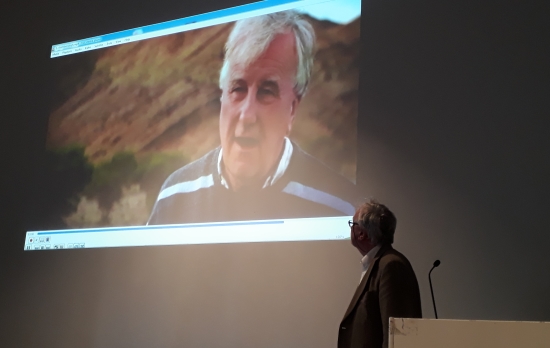
The evening began with a ‘behind the scenes’ tour of the Herbarium and the Palaeontology Department, and Richard’s knowledge was invaluable here when it came to observation of the fossil specimens.
Following a delicious buffet, where new contacts were made and old acquaintances re-kindled, forty members, their guests and dignitaries from RSB settled down to an awe-inspiring lecture on trilobites. Over 20,000 species of trilobite have been discovered and named from fossil records, their calcite skeletons ensuring successful preservation in the rocks of the Cambrian and Permian eras. With similarities to modern-day horse shoe crabs, some were as large as lobsters.
Research recognises that the diversity and physiology of trilobites can be used to establish the ecology and habitats of the time. They were probably the first creatures to develop complex eyes, hemispherical structures enabling 360 degree vision, some with brow ridges to shade the light. A whole genus of trilobites are recorded as having tridents emerging from their heads. Their function? The audience were asked for suggestions, which included: a tool for foraging in the seabed, a weapon for combat, and a touch or vibration receptor.
The form of the trilobite was initiated in the Pre-Cambrian era and they occupied shallow and deep waters, but never emerged from marine environments, their fossil record therefore helping us to establish the position of the oceans before continental drift. This was a thoroughly engaging lecture delivered by a man devoted to his subject, who was generous enough to share his passion.
Jean Wilson MBE CBiol FRSB
Branch BioChallenge 2018
27 June 2018
The North Western branch of the RSB has held an annual competition for A level students for the past 20 years. This year the University of Central Lancashire hosted the event again and saw students from 14 schools and Further Education colleges congregate in Preston to compete in the NW Branch BioChallenge.
A series of questions designed to stretch the students were posed by UCLAN staff and members of the Branch committee and covered a broad range of disciplines. With questions ranging from genetic manipulation and molecular biology to ecology and identifying aquatic organisms from different rivers, the students enjoyed the variety and could really appreciate the breadth of biology.
The BioChallenge has always had a strong emphasis on practical and applied questions and this year was no exception with students having the opportunity to get their hands dirty (literally) with heart and kidney dissection and digging in soil to find earthworms, a useful indicator species in soil toxicology. Other question highlights were “CSI Preston” where UCLAN’s School of Forensic and Applied Science had set up a mock crime scene to explore and “What’s wrong with Stan?” where students diagnose a medical condition in a life size clinical mannequin.
Congratulations this year go to Lancaster Girl’s Grammar School who held of stiff competition from Bolton’s Canon Slade School in second and Bolton School Girl’s Division in third. Winning for a record fifth time, Lancaster Girl’s won a microscope and digital camera to support teaching. Head of Biology at LGGS Richard Pim explained how the microscope is “Another great asset thanks to the Society of Biology and constantly used by our sixth form students”.
So as the NW Branch BioChallenge enters its third decade, can a school come and challenge Lancaster Girl’s Grammar for their crown?
If you know of a school who might be interested next year, please contact northwest@rsb.org.uk for more details.
Thanks, as always, go to the NW branch committee members and staff at UCLAN for setting questions and for the Schools of Pharmacy and Biomedical Sciences, and of Forensic and Applied Science at UCLAN for sponsoring the prize and refreshments.
Dr Chris Smith MRSB
River Restoration on the River Wyre
24 September 2017
On a September Sunday, North Western branch members were guests of Wyre Waters Catchment Partnership. Thomas Myerscough (programme Manager) and Melanie Hartley (Tidal Wyre Project Officer) from the Wyre Rivers Trust were our hosts.
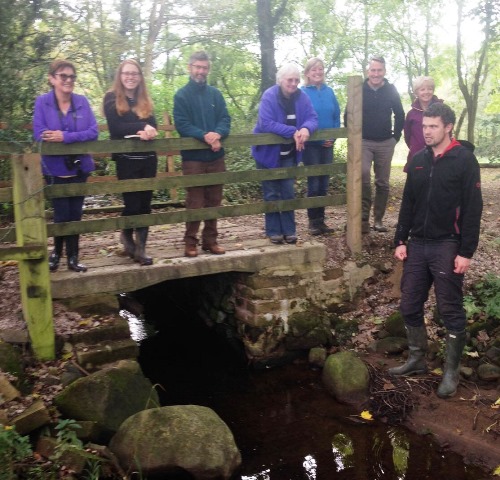
The source of the River Wyre lies in the Bowland Fells on the Abbeystead Estate, home of the Duke of Westminster. Like many rivers in the United Kingdom, the river has been used and abused, including modifications to flow as well as the import of faecal matter, herbicides, pesticides and fertilisers. The result has been loss of habitat, reduced biodiversity and pollution.
However, under the guidance of our hosts we observed the many interventions carried out over the past three years to reverse these trends. These included removal or notching of weirs, and the introduction of woody debris to create a more sinuous water channel; the erection of stock-proof fencing to improve biodiversity in the riparian zone, improvements on farms with regards to slurry storage and disposal, and soft engineering to increase bank stability. All changes are monitored with kick sampling and electro-fishing, and the results are incredibly positive.
Jean Wilson MBE CBiol FRSB
North West Bio Challenge
28 June 2017
Students from the North West of England's schools and sixth form colleges came to the University of Central Lancashire (UCLAN) to compete in the North West Bio Challenge. Teams of four students spent the day having their biological knowledge tested with a series of 10 quiz questions linked to the A level syllabus, created and operated by members of the North Western branch and UCLAN technical staff.
The questions included practical and problem solving tasks such as identification of human parasites and their preferred location in (or on) the body ('Pin a Parasite'); the ever popular physiological and pharmacological skills test and simulation (featuring 'Stan the Man') as well as biomedical and ecology-based questions such as 'What a Tangled Web We Weave'. After an incredibly close result, the 1st prize of a microscope was awarded to Hutton Grammar School by Alexandra Spencer AMRSB, membership and marketing officer of the Royal Society of Biology, along with a book prize for each team member. In second place, Bolton School Boys Division; third place Lancaster Girls Grammar School; and in fourth Canon Slade School.
Book prizes and were also awarded to teams finishing in 2nd, 3rd and 4th, whilst all participants were given an RSB mug and an attendance certificate. We would also like to thank Alexandra for organising and delivering a CPD event for the accompanying teachers which explored the support and educational resources available to them through the Society and the Schools and Colleges Affiliation Scheme.
As in previous years, the performance of the teams was high and feedback from participants very positive. A big thank you to the NW branch committee, and we are indebted to Dr Chris Smith and his colleagues from UCLAN for their excellent organisation, hospitality and administration which ensured the day was such a brilliant success.
Professor Graham Bonwick FRSB CBiol
Off to Chester Zoo
20 May 2017
The North Western branch held its AGM at Chester Zoo in May with 37 members and guests in attendance. After refreshments, the essential agenda items were covered with reports from the chair (Graham Bonwick) and treasurer (Geoff Holdroyd).
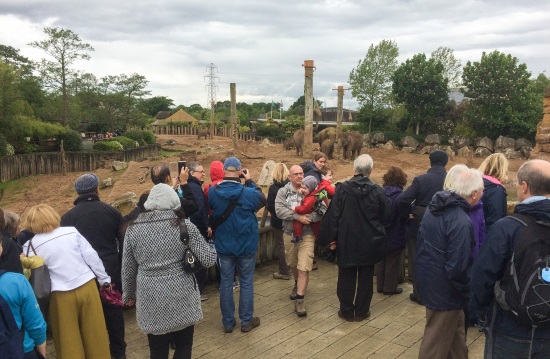
Secretary Glenn Upton-Fletcher presented the range of activities carried out over the last twelve months. With the essential administration out of the way, we were treated to a talk by Sarah Bazley, Chester Zoo's learning manager. Sarah covered the role of zoos in the 21st century including details of the contribution of Chester Zoo to the international community.
The talk was both interesting and balanced and well received by all present. After an excellent buffet lunch, Sarah and her colleague Charlie conducted a guided tour focusing on the husbandry, breeding and moving practices of giraffes and elephants.
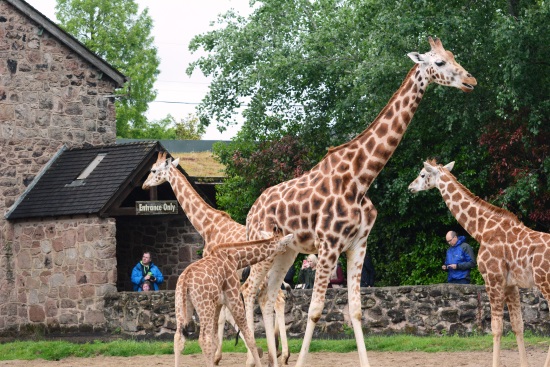
In testament to Glenn's meticulous planning, the heavy rain of the morning ended as the group moved out into the grounds. After the tour, we were free to explore the whole complex. For me, the 'Monsoon Forest' with the tentacled snake, gharial crocodile and Sumatran orangutans was a must. A very enjoyable day and big thank you to the staff at Chester Zoo.
Alan Bedford MRSB
Wild and edible and plant walk
22 April 2017
On a cool but bright and sunny Saturday morning in April, 17experienced and novice biologists assembled in the beautiful heart of the Ashworth Valley to meet with David Winnard, our expert guide for the day. David has been foraging since he was a boy and learnt of many of the local edible plants and fungi from his grandmother before he became a professional botanist.
David has published articles on foraging for many years as well as appearing on radio and TV to share his passion. As we walked we were treated to not only detailed information on the natural history of the edible and poisonous plants and fungi, and of the North West region, but also stories and folklore around some of the more notorious species.
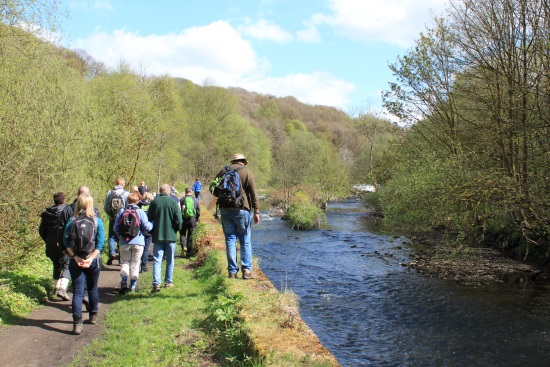
Photograph taken by Chris Smith
In all 23 species were identified and many were sampled as David invited the group to smell and taste the seasonal fayre. As the sun shone warmly we settled to lunch in the river valley to taste a hearty soup prepared by David from freshly foraged wild garlic (Allium ursinum) and nettle (Urtica dioica) and a wonderful pesto made from the same species.
In the afternoon sun we dug for elusive but tasty pignuts in a meadow at the top of the valley. David harvests pignuts regularly from this site but takes care to re seed the area to maintain the ecosystem. Although it was not the season for fungi, we did find some species, including Turkey Tail (Trametes versicolor) and Jelly Ear (Auricularia auricula-judae) from the previous season. And on the eve of St George's day we were treated to a bounteous crop of St George's mushroom (Calocybe gambosa), which many of the group were able to take home and cook.
It was a wonderful and highly informative day enjoyed by all, with several new members joining our events for the first time. We can highly recommend David Winnard's foraging walks and talks. (www.discoverthewild.co.uk).
Dr David Wareing MRSB
Bee Day
11 July 2015
Committee members and locals from the North West branch were treated to a honey-themed afternoon tea following a meeting in Hambleton on the Wyre Estuary. Homemade fruit cake, oat and honey biscuits and toffee fudge were washed down by copious amounts of tea served in china cups and saucers.
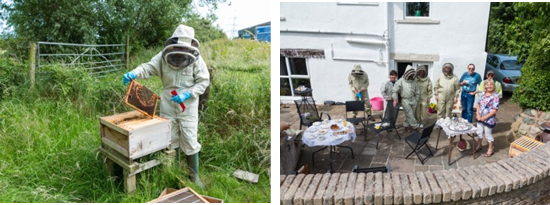
Mead tasting sparked conversation about different flavours – sweet mead originating from Lindesfarne and a homemade amateur mead which tasted like dry wine. Different types of honey were available to taste – two local sources (Weeton and Galgate) and two from farther afield (the Greek islands of Skiathos and Rhodes). Members were split on which was the best but the local honey got the thumbs up.
Bee suits were then donned for a tour of a small apiary conducted with local beekeeper Janet Preece, who answered a lot of questions. The site showed how different methods of beekeeping can be practised with different hive types – both National and Warré hives. Observation windows in the Warré hive showed the bustling activity of a colony and the sheer number of bees present. A National hive was opened and everyone was treated to the view of a new worker bee emerging from its cell and an audience with the queen as she wandered across the comb.
The afternoon concluded with a short quiz based around bees and many were surprised with the number of different species found in the UK (around 250). With the sun shining, everyone agreed it was an enjoyable, informative and sweet-tasting afternoon.
Janet Preece MRSB
Annual North Western Schools Quiz
24 June 2015
Each year biology students from the Cumbria, Lancashire, Greater Manchester and Cheshire face 10 sets of taxing questions as part of the North Western Branch Annual Schools' Quiz.
Over the 17 years the quiz has been running, very few of the questions have been repeated; setting them, therefore, is an onerous task for the quizmasters. When new programmes such as Only Connect appear on television they are quickly seized upon as an idea for a set of questions.
Therefore Dr Alan Bedford's questions required the students to make connections between four statements, supply a missing statement in a biochemical series, and identify biological terms with all their vowels taken out.
The article 'Pitcher Perfect' by Dan Rowson AMRSB from the April/May edition of The Biologist was the inspiration for Jean Wilson's question set, called 'Plant Plots'.
Surrounded by live specimens of Venus fly trap, sundew, pitcher plant, salvia, sweet peas, foxgloves, red campion, dandelion, night-scented stock and impressive models of apple blossom and salvia, students were tested on the adaptations of plants with regards to nutrition, pollination and seed dispersal.
The remaining eight challenges covered subjects including human evolution, pollen proteins and identification, forensic entomology, and many more.

L-R: Stan the Man and winning school, Cardinal Newman College
After six hours of assessment the results were announced: Cardinal Newman College were this year's winners, followed by Lancaster Girls' Grammar, Xaverian College and Canon Slade School. The top team are presented with a high quality microscope presented by the North Western branch and UCLAN. The preparation for 2016 will start again in January, so if anyone has an idea for a quiz question it will be gratefully received.
Jean Wilson MBE CBiol FRSB
North Western Mammal Trapping
18 April 2015
We gathered early on a crisp and fresh but clear spring Saturday morning not far from Ormskirk, on a 12 hectare rather special woodland. A mixture of mature and young woods with a very broad diversity containing deciduous and coniferous trees as well as glades and wildflower meadows. Currently under private ownership, the site is being developed by the owner to cater for guided natural history walks for education, schools, universities, friends of nature, and interestingly for part to become a traditional orchard.
After a brief introduction and splitting into two smaller groups we were expertly guided through the traps and with each one approached with an excitement not only felt by the to younger members of the group but the adults as well. One participant was armed with a rather special bit of kit that created a great deal of interest and enthusiasm, a thermal imaging camera. The device brought with it some very interesting and engaging conversation, for possible uses, projects and research ideas. The heat signals from the different mammals and their changes were fascinating and a challenge to track. From numerous common voles and shrews to the much rarer pigmy shrew, and the endearing wood mice we had plenty to record and set free.
The second part after the main survey involved a short introduction to photographing small mammals. After setting up and a few of the group quickly settled into recording a few mammals, and trying techniques as the subjects dictated.
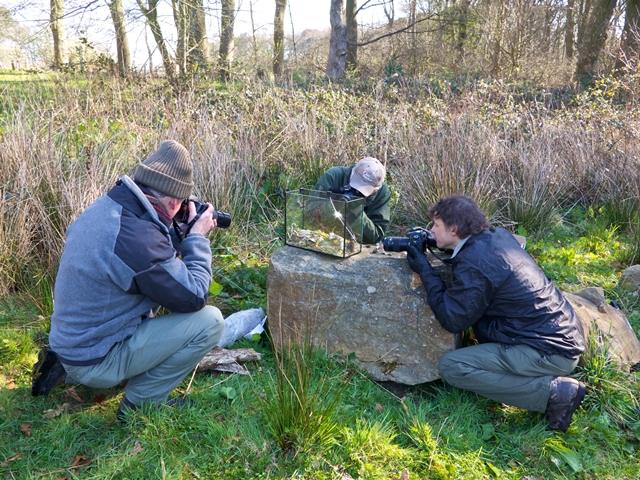 Credit: Glenn Upton-Fletcher
Credit: Glenn Upton-Fletcher
The day finished with a more leisurely and intimate guided tour of the whole site complete with orchard, bluebells, other specialities and a winding river. A memorable event that was fully subscribed and one that we hope to repeat.
Glenn Upton-Fletcher AMSB
Branch AGM held at Myerscough Agricultural College
28 March 2015
It was an idyllic setting for the AGM of the North Western branch, Myerscough Agricultural College lies within the heart of the Lancashire countryside. The College was founded in 1894 and is set in 700 hectares of green belt owned by the Duchy of Lancaster, it aims to maintain a balance between education, commerce and research, the latter ensuring links with universities in Manchester, Liverpool, Lancaster and Preston. The working farm on site has over 1000 ewes and 200 dairy cattle, the milk being bought by the Co-operative Group. Future plans envisage the milk being used to make cheese and ice cream on site in conjunction with local suppliers.
The AGM received the Chairman's report along with the update on the branch activities for the past year, some of the past challenges and looking at the year ahead. The elections and re-elections went smoothly with new committee members added.
Following the rigours of the AGM we were invited to view the most amazing images taken by award winning wildlife photographer Glenn Upton-Fletcher MSB. The subjects of his studies range from mites on burrowing scorpions to the lifecycle of tadpoles in his garden pond to elephants roaming the plains of Zimbabwe. Glenn will be running two short courses to support branch activities in May 16th and June 5th this year.
After lunch the delegates were taken on a tour of the College by Dr David Elphinstone, beginning with the new, state of the art glasshouses where all parameters were computer controlled and the plants produced were retailed in the College Garden Centre. Kathy Kissack greeted us at the Veterinary Nursing School with its working kennels and cattery. The aim of the cattery is to work with stray cats, 'patching-up', neutering and re-housing them. The 400 students enrolled in this School are on courses ranging from nursing care assistants to graduate veterinary nurses. Students practise on simulated dogs, which are very life-like, rehearsing techniques such as X-rays, anaesthetising and bandaging.
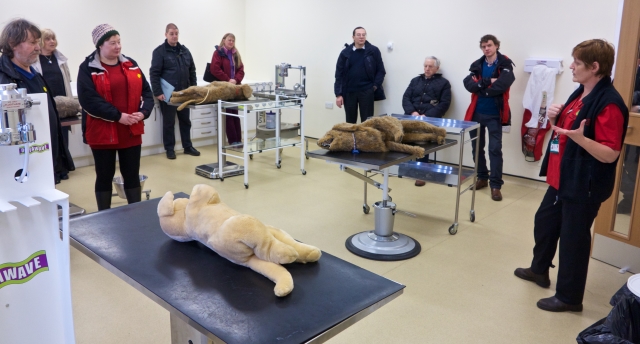 Credit:Glenn Upton-Fletcher
Credit:Glenn Upton-Fletcher
It was indeed 'A Grand Day Out', linking business and pleasure!
Jean Wilson MBE CBiol FSB
All at sea!
1 November 2014
It was third time lucky for members of the North Western Branch when they trawled the Wye Channel in the south of Morecambe Bay, previous attempts having been cancelled because of poor weather.
The source of the River Wyre is in the beautiful Bowland Fells near Abbeystead and flows only through the county of Lancashire. Passengers assembled at Fleetwood ferry terminal before boarding the small inshore boat owned by local artisanal fishermen. Once in the undredged channel of the Wyre estuary a trawl net fitted with otter boards was lowered onto the soft sediment of the seabed, little more than two metres deep.
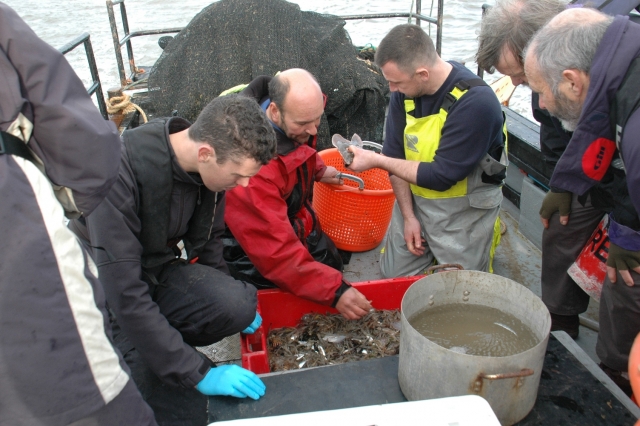
As one might expect the bulk of our catches during the five hours at sea was made up of the brown shrimp (Crangon crangon), but other species included hermit crab, shore crab, swimming crab, pink prawn, edible mussel, cuttlefish, cat shark, dab, plaice, dover sole, turbot, flounder, red gurnard, dragonet, scorpion fish, pipefish, sand goby, sprat, cod, smelt, seabass and the lesser weaver!
The weaver fish did come with a warning to the highly toxic dorsal spines. It wasn't just sub-littoral species that held our attention on this beautiful sunny day, but also the aerial displays of seabirds such as lesser and greater black backed gulls, black headed gulls, herring gulls, cormorants, shelducks and oystercatchers. On our return to port the crew cooked a pan of shrimps and after cooling them in seawater they were enjoyed by all .... seafood doesn't get much fresher than that.
Jean Wilson MBE CBiol FSB
Colourful grassland fungi
1 November 2014
There was much anticipation in the run up to this year's fungal foray - what would this year bring with the seasonal timings and conditions marrying with actual weather conditions of the day.
The event was held on a clear, calm and sunny day. With introductions over, we anticipated getting both a morning session and afternoon session in. However so successful were the morning findings, and that we unanimously threw in the towel on return to base for lunch. Our youngest participant aged nine did a splendid job as tracker and spotter, sparing our energies, and alerted us to many and increasingly delightful findings, including one of several highlights, the scarlet caterpillar club.
We encountered a good number and variety of grassland species and along with each one we learned about the ecology, history, uses, and whether it was edible or had any medicinal or other traditional use. Each year this event makes for a great day out, and this year was another pleasantly enjoyed by all.
Glenn Upton-Fletcher AMSB
Schools Quiz
18 June 2014
Our Biology Schools’ Quiz began 14 years ago at Edge Hill University College (now Edge Hill University, Ormskirk), with Dr Alan Bedford as the resident host. Alan received the President’s Medal in 2013 for his services to the North Western branch.
Now 20-30 schools meet at the University of Central Lancashire at Preston with Dr Leroy Shervington as resident host. After their AS exams, teams of four Year 12 students battle it out over 10 biology-based challenges, competing for the prize of a microscope for their school. The challenges are mainly practically based requiring sound biological knowledge, the ability to apply logic and be creative.
This year challenges included the identification of trees and molluscs using dichotomous keys, a snail habituation experiment, hormone chemistry, thought-provoking imagery, anatomical structures named after famous scientists (eg Ranvier), Stan the Man - a robotic patient, fossils, living fossils and biological drawing.
This year’s top four schools were: 1st - Lancaster Girls’ Grammar, 2nd - Cardinal Newman College at Preston, 3rd - Fallibroome Academy (Macclesfield) and 4th - King George V College (Southport).
All participants received a Society of Biology mug and the top four school representatives receive a book prize. David Urry, regional coordinator at the Society, presented the prizes after an inspiring speech to future biologists from the North West.
David spent the morning with the teachers who had accompanied their teams and discussed the opportunities and value offered by the Society of Biology. The committee has often wondered whether previous contestants have gone on to careers in biology and we now know of one for sure: this year Peter York, a team member in 2006, provided questions. He’s now a PhD student at Chester University and treasurer for the branch.
Jean Wilson MBE CBiol FSB
AGM and Bat talk
22 March 2014
The historic National Boat Museum at Ellesmere Port was the venue for our AGM. The event was well attended, with 35 individuals present, and the following members were elected to the Committee: branch vice chairman - Mike Clapham; branch schools liaison - Leroy Shervington; events organiser - Karen Lawson; Committee member - Jean Wilson, Ian Fleetwood, Alan Bedford, Linda Martin. Chair Graham Bonwick, secretary Glenn Upton-Fletcher and treasurer Peter York will continue in post.
The treasurer's report confirmed that the branch finished the year with a small surplus. As part of the Chair's report, the range of events and activities were reviewed and the increasing success and member participation was noted. A discussion concerning future events was held and suggestions received from the members present.
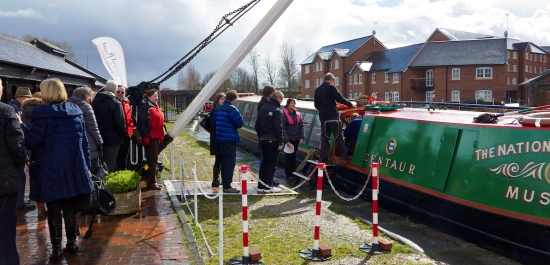
Members were then treated to a lively and informative presentation on the status of bats and their conservation by Ged Ryan from the Cheshire Bat Group. The highlight of the event for some was the opportunity to see a bat at close range. This was followed by a buffet lunch, a canal boat trip and a guided tour of the National Boat Museum. The Manchester Ship Canal and River Mersey provided an exciting backdrop to the proceedings of the day.
Graham Bonwick CBiol FSB
Science Busker David Price
4 December 2013
In December we united with the University of Chester Centre for Science Communication (Scicomm) to host 'An Interactive Audience with David Price'. David is a time served multi-award winning science communicator dedicated to developing effective interactive science 'experiences' for audiences of all ages and abilities.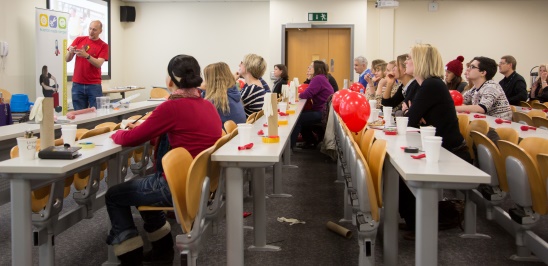
David attends the cream of National and International street performance events and in 2010 was awarded the Manchester Science Festival 'Josh' award for outstanding innovation in science communication for his work in developing and popularising science busking techniques.
David successfully cajoled each and every member of the audience into participating in a plethora of interactive high energy, informative and highly entertaining demonstrations. No participants were harmed during the process.
The audience remained enthralled as he demonstrated and subsequently analysed his proven successful science communication methodology, covering areas such as tackling nerves, building confidence, using props, voice and body language, interacting, feedback and safety, at the same time outlining some of the rewards and challenges for those considering a career in the science communication arena.
The event was attended by a broad range of age groups, including recently qualified University of Chester STEM ambassadors and a number of key educators from regional institutions and organisations.
Karen Lawson MSB
Schools Quiz
19 July 2013
Once again, 24 teams of four students from the North West's schools and sixth form colleges descended on the University of Central Lancashire, to pit their wits against the tests and trials of biological knowledge devised by members of the branch. A total of 10 diverse questions were attempted including practical and problem solving tasks such as taxonomic identification from microscopy of skin and hair (Fur Trade), matching hosts to parasites (Unwanted Guests), physiological and pharmacological skills and simulations, chemical analysis, cell biology and ecology.
1st prize of a microscope was awarded to The Manchester Grammar School by Dr Mark Downes FSB, chief executive of the Society of Biology, along with a book prize for each team member. Book prizes were also awarded to teams finishing in 2nd (King George V College), 3rd (St Wilfrid's CE Academy) and 4th (Sandbach High & Sixth Form College) whilst all participants were given one of the limited edition souvenir mugs complete with the Society crest. As in previous years the standard was extremely high and the North Western branch is indebted to Dr Leroy Shervington and colleagues from UCLAN for hosting the event. Their organisation and administration ensured the day was such a success.
Graham Bonwick CBiol FSB
Wildlife photography workshop
11 May 2013
The workshop took place on Hilbre Island, a small uninhabited island located in the Dee Estuary. The party set off from the slipway at West Kirby under the watchful eye of Glenn Upton-Fletcher (Wildlife Photographer of the Year) and leading biological illustrator Mike Clapham. Crossing the sands at low tide, first to Little Eye then Middle Eye, meant that the party was ultimately cut off from the mainland by the advancing tide. On arrival we were greeted by the unexpected sight of the Hilbre Island bluebells and after scrambling over sculpted Bunter Sandstone, refuge from the elements was sought in the old Wardens cottage.
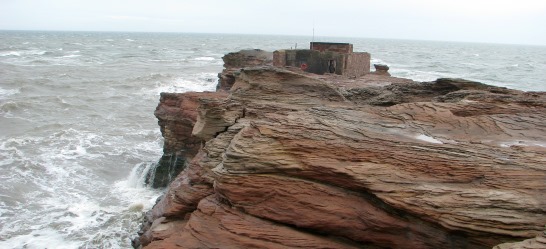
An introduction to some of the basics of practical wildlife photography was provided along with a guide to equipment essentials. This was followed by an opportunity to put our new found ideas in to practice supported by Glenns' expert one-to-one tuition. An invaluable introduction to the challenges of wildlife photography, complete with intermittently hostile weather, made for a highly enjoyable and rewarding day topped with a diverse range of marine wildlife observations including the local Common Seals.
Graham Bonwick CBiol FSB, Chairman
Marine day
24 October 2012
"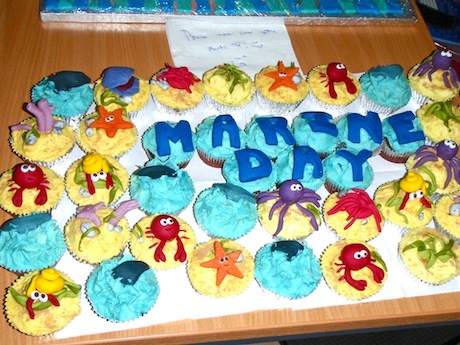 Oh! I do like to be beside the seaside"! Especially during Biology Week.
Oh! I do like to be beside the seaside"! Especially during Biology Week.
Blackpool and the Fylde College, Sealife Blackpool and our branch sponsored a Biology Week Marine Day in Blackpool. The morning comprised of workshops run by: Katrin Lorengi from Seawatch whose activity was based on the identification of cetaceans native to British waters: Dr Dan Exton from Opwall who demonstrated the techniques involved in underwater surveys of coral reefs and Glenn Upton-Fletcher who shared his own personal experiences when it comes to photographing wildlife.
Our first lecture of the afternoon was delivered by Matt Clough who is responsible for shark tagging in the Mersey estuary and Liverpool Bay. He explained the necessity for research and the species that have been recorded in the area. Dr Exton, detailed the varied research opportunities available for students through Operation Wallacea.
Delegates spent the early evening at the Sealife Blackpool, without the general public! The aquarists were on hand to take members and friends on informal tours around the aquaria, laboratories and quarantine area. The senior aquarist was Martin Sutcliffe who won the Society's 2007 bioscience student of the year at Blackpool and the Fylde College. The day was concluded with a wine and cheese supper in view of the sharks who showed little interest in the tasty Lancashire Creamy!



